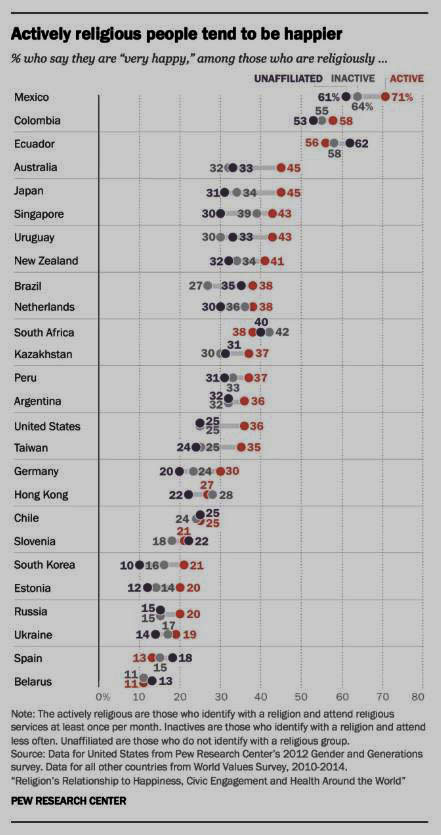by WorldTribune Staff, February 6, 2019
Those who engage in regular religious practice are more likely to describe themselves as “very happy” compared to those who are less religious, a new Pew Research Center poll said.
In the poll, religiously active respondents in 19 of the 26 nations surveyed said they were “very happy” people.
 The Pew survey divided respondents into three categories: the “actively religious,” who are affiliated with a religion and attend a worship service at least monthly; the “inactively religious,” who are affiliated but attend less often; and the unaffiliated (or “nones”), who do not identify with any religion.
The Pew survey divided respondents into three categories: the “actively religious,” who are affiliated with a religion and attend a worship service at least monthly; the “inactively religious,” who are affiliated but attend less often; and the unaffiliated (or “nones”), who do not identify with any religion.
In the United States, 36 percent of the actively religious described themselves as “very happy,” while only 25 percent of the inactively religious and 25 percent of the unaffiliated said they were “very happy,” the poll found.
The religiously active are also likely to be more engaged socially and civically. Religious people are more likely to vote in elections and to join charitable organizations, including non-religious organizations, than the religiously inactive and unaffiliated, the poll found.
According to sociologist Robert Putnam, church attendance also has a documented positive effect on children and education.
“A child whose parents attend church regularly is 40 to 50 percent more likely to go on to college than a matched child of non-attenders,” said Putnam, author of “Our Kids: The American Dream in Crisis”.
Children involved in a religious organization “take tougher courses, get higher grades and test scores, and are less likely to drop out of high school,” which means they also have better employment prospects, Putnam said.
The Pew poll found that, in Japan, those who are religiously active are significantly happier than the religiously inactive and the unaffiliated, with 45 percent, 34 percent, and 31 percent respectively being “very happy.”
In Australia, the gap is even wider, with 45 percent of the religiously active reporting being very happy, as compared with only 33 percent of the religiously inactive and 32 percent of the unaffiliated.
A 2014 study by the Austin Institute for the Study of Family and Culture found that those who attend religious services on a weekly basis are nearly twice as likely to describe themselves as “very happy” (45 percent) than people who never attend (28 percent).
Those who never worship are twice as likely to say they are “very unhappy” (4 percent) as those who attend services weekly (2 percent), that study revealed.
Out of three religious indicators employed – self-reported “religiosity,” religious “affiliation,” and service attendance – the latter showed a significantly greater correlation to increased happiness. The study showed that higher levels of church attendance “predict higher life satisfaction,” even after accounting for how important religious faith is in people’s lives.
Check Out Geostrategy-Direct __________ Jump Start the U.S. Media
